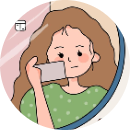Change to questions and answer them with short answers we know her

Những câu hỏi liên quan
Change to questions and answer them with short answers l work hard
Change to questions and answer them with short answers I like cold weather
What is your favourite weather?
I like cold weather
Đúng 0
Bình luận (0)
Do you like cold weather?
yes, i do/no, i don't
Đúng 0
Bình luận (0)
Change to questions and answer them with short answers 7 she goes to school by bus
Change to questions and answer them with short answers 5 he like in Saudi Arabia
does he like in Saudi Arabia?
yes,he does/no, he doesn't
Đúng 0
Bình luận (0)
Change to questions and answer them with short answers l plan my weekend on monday
When do you plan your weekend?
I plan my weekend on Monday
Đúng 0
Bình luận (0)
Change to questions and answer them with short answers 6 she has breakfast at home
Change to questions and answer them with short answers 8 it rains a lot in Brazil
does it rain a lot in Brazil?
yes, it does/no, it doesn't
Đúng 0
Bình luận (0)
Change to the questions and answers them with short answers 2 she swims once a week
himself, let alone correct them. We do it all for him. We act as if we thought that he would never notice a mistake unless it was pointed out to him, or correct it unless he was made to. Soon he becomes dependent on the teacher. Let him do it himself. Let him work out, with the help of other children if he wants it, what this word says, what the answer is to that problem, whether this is a good way of saying or doing this or not. If it is a matter of right answers, as it may be in mathematics or...
Đọc tiếp
himself, let alone correct them. We do it all for him. We act as if we thought that he would never notice a mistake unless it was pointed out to him, or correct it unless he was made to. Soon he becomes dependent on the teacher. Let him do it himself. Let him work out, with the help of other children if he wants it, what this word says, what the answer is to that problem, whether this is a good way of saying or doing this or not.
If it is a matter of right answers, as it may be in mathematics or science, give him the answer book. Let him correct his own papers. Why should we teachers waste time on such routine work? Our job should be to help the child when he tells us that he can't find the way to get the right answer. Let's end all this nonsense of grades, exams, and marks. Let us throw them all out, and let the children learn what all educated persons must someday learn, how to measure their own understanding, how to know what they know or do not know.
Let them get on with this job in the way that seems most sensible to them, with our help as school teachers if they ask for it. The idea that there is a body of knowledge to be learnt at school and used for the rest of one's life is nonsense in a world as complicated and rapidly changing as ours. Anxious parents and teachers say, "But suppose they fail to learn something essential, something they will need to get on in the world?" Don't worry! If it is essential, they will go out into the world and learn it.
Question 50: The author fears that children will grow up into adults who are __________.
A. unable to think for themselves
B. too independent of others
C. unable to use basic skills
D. too critical of themselves
Đáp án A
Dịch nghĩa: Tác giả lo rằng những đứa trẻ lớn lên sẽ trở thành những người lớn mà ________.
A. Không thể tự suy nghĩ
B. Quá phụ thuộc vào người khác
C. Không thể sử dụng những kĩ năng cơ bản
D. Qua khắt khe với bản thân
Giải thích: Tác giả phê bình việc chỉ ra lỗi sai của trẻ và sửa nó giúp trẻ. Như vậy có thể suy ra là nếu cứ tiếp tục như vậy thì khi lớn lên, không ai chỉ cho, nó sẽ không thể độc lập suy nghĩ. Dễ nhầm lẫn với B nhưng phương án B chỉ đúng khi còn nhỏ, nó phụ thuộc vào thầy cô và cha mẹ để giúp nó, còn khi trưởng thành thì kết quả là nó không suy nghĩ được, đáp án A.
Đúng 0
Bình luận (0)











